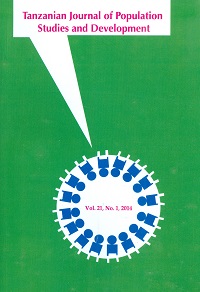The Tragedy of the Commons and High Fertility, Social Mobility and Poverty in Tanzania Mainland
Abstract
The demographic revolution reached Tanzania and other third world countries in an accelerated form. Pronatalists operate on grounds of an ahistorical demography and set aside this point because of ideology. They see no connection between high fertility and absolute poverty. Few scholars will now argue that in Sub-Saharan Africa rapid population growth is compatible with rapid economic growth. Even the Marxian argument that population growth will give rise to a multiplication of production units where capitalism is not developed in not tenable. Quite often the new units are lower in productivity and organization, and Malthusian types of hunger are common. Little vertical and intergenerational mobility in the Tanzanian society produced long-term fatalism, which is conducive to high fertility. It is argued that the tragedy of the commons in resources ownership, services and reproduction hinders social mobility and the evolution of a large middle class. The tragedy entrenches poverty and directly contributes to high fertility. Freedom in reproduction, like freedom in land use, brings ruin to all. It is shown that poor people have an idealistic view that they have the right to have many children, and these children have the right to education, health, land, etc., but what is missing in this idealistic view is an insistence that rights and responsibilities must go together. Asserting inalienable rights while ignoring or denying marching responsibilities brings ruin to all. Thus the paper concludes that that promoting a rapid evolution of a middle class may bring a more judicious balance between population and resources use.
References
Ahmad, A. 1984. Agricultural Stagnation under Population Pressure: The case of Bangladesh. New Delhi: Vika S. Publishing House PVT Ltd.
Baregu, M. 1987. The African Population Problem: Situational Versus World Historical Perspective. Utafiti, IX(2).
Boserup, E. 1985. Economic and Demographic Interrelationships in Sub-Saharan Africa. Population and Development Review, 11(3).
Buchanan K. 1980. Delineation of the Third World. In I. Vogeler and A.R. de Souza (eds.). Dialectics of Third World Development. Montclair: Allanheld, Osmum & Co. Publishers Inc.
Caldwell, J.C. et al. 1912. Fertility Decline in Africa: A New Type of Transition." Population and Development Review, 18(2), June 1992.
Clark, C. 1969. Population Growth and Land Use. London: Macmillan.
Dar, A. & R. Levine. 1960. Higher and Technical Education in Tanzania Investments Returns and Future Opportunities. Washington DC.: Green Cover, World Bank.
Hankansson, T. 1989. Social and Political Aspects of Intensive Agriculture in East Africa: Some Models from Cultural Anthropology. Azania, XXIV 1989.
Hardin, G. 1974. Lifeboat Ethics: A Malthusian View. in Vogeler I. & A.R. de Sonza (eds.).
Hardin, G. & J. M. Baden (eds.). 1977. Managing the Commons. San Francisco: W.H. Freeman and Company.
Kamuzora, C.L. 1999. A Youthful Population: The Ultimate Resource for Africa, Tanzania for all Time. University of Dar es Salaam, Professorial Inaugural lecturer, 25th October 1999.
Lloyd, W.F. 1833. On the Checks to Population. In G. Hardin, & J. Baden (eds.). (ibid.)
Madulu, N.F. 2001. Reversed Migration. Trends in Kondoa Eroded Area: lessons for Future Conservation Activities in Hado Project Areas. Tanzania, Social Science Research Report Series No, 20, OSSREA, Addis Ababa.
Mbegu, A.C. & W.C Mlenge,. 1983. Ten Years of Hado 1973-1983, Ministry of Natural Resources and Tourism, Forestry Division, Dar es Salaam.
National Bureau of statistics (NBS and ORC Macro. 2005. Tanzania Demographic and Health Survey 2004 -05. Dar es Salaam.
--. 2011. Tanzania Demographic and health Survey 2010. Dar es Salaam.
Platteau, J.P. 2000. Institutions, Social Norms and Economic Development, Harwood Academic Publishers, Australia.
Ross J.B. 1980. Ecology and the Problem of Tribe: A Critique of the Hobbesian Model of Preindustrial Warfare. In E.B. Ross (ed.). Beyond the Myths of Culture, Essay in Cultural Materialism. New York: Academic Press.
Rostow, W.W. 1990. The Stages of Economic Growth: A Non-Communist Manifesto. Cambridge: Cambridge University Press.
Schaefer, R.T. 2003. Sociology. Boston: McGraw-Hill.
World Bank. 1995. Tanzania Social Sector Review, Washington DC.
United Republic of Tanzania (URT). 1996. Tanzania Demographic and Health Survey 1996. Bureau of Statistics, Planning Commission, Dar es Salaam.
--. 2006. MKUKUTA National Strategy for Growth and Reduction of Poverty, Status Report 2006: Progress Towards the Goals for Growth, Social Well €“ Being and Governance in Tanzania, Creative Eye Ltd, Dar es Salaam.
Vogeler, I. and A.R. de Souza (eds.). 1980. Dialectics of Third World Development, Allanheld, Osmum & Co. Publishers. Inc., Montclair.


